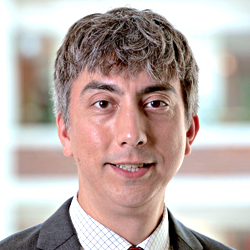Aaron Hata, MD, PhD

Kristine and Bob Higgins MGH Research Scholar 2025-2030
Physician-Investigator, Mass General Brigham Cancer
Associate Professor of Medicine, Harvard Medical School
Developing New Cancer Therapies to Target Tumor Evolution and Overcome Treatment Resistance
As a thoracic oncologist and physician-scientist, it has been my privilege to witness, and in some cases contribute to, a revolution in the treatment of lung cancer.
When I began my clinical training in 2007, the first targetable oncogenic alterations in lung cancer had recently been discovered. This launched an unprecedented era of target discovery and drug development that has now yielded over 20 FDA-approved targeted therapies for eight different oncogenic drivers.
Over this period, we have learned that although these therapies are initially effective, they are not curative.
My group, along with many others, has identified mechanisms of acquired drug resistance that drive tumor relapse, and we have helped develop next generation therapies that can re-induce tumor responses. While these therapies have improved patient survival, drug resistance inevitably develops again.
Motivated by a desire to overcome this perpetual cycle of drug resistance, I have increasingly focused my laboratory research on understanding the process by which tumors evolve under the selective pressure of initially effective therapies.
The goal of my current research is to identify the fundamental mechanisms that enable tumor cells to evade targeted therapies and drive evolution of drug resistance. My long-term goal is to provide the scientific foundation for clinical development of adaptive therapies that can target tumor evolution and prevent acquired drug resistance.
With the support of the MGH Research Scholar award, my immediate future goal is to leverage our experience in patient-derived tumor models to develop a new generation of patient-derived experimental systems that incorporate the tumor microenvironment: ex vivo “tumor ecosystems.”
This platform will enable us to combine and manipulate cancer cells and supporting cells from the tumor microenvironment in a controlled and reproducible manner. We will use these models to study how specific cell interactions influence the cell states and evolutionary trajectories of tumor cells during drug treatment. Ultimately, we plan to deploy these model systems more broadly in genetic and pharmacologic screening efforts to facilitate a new phase of therapeutic target discovery.
I feel honored and privileged to be named an MGH Research Scholar. The support provided by this award will be instrumental in helping us turn these goals into reality and ultimately bring transformative therapies to patients.
MGH Research Scholars
Since 2011, thanks to the support of many generous families, 90 MGH Research Scholar awards have been bestowed.